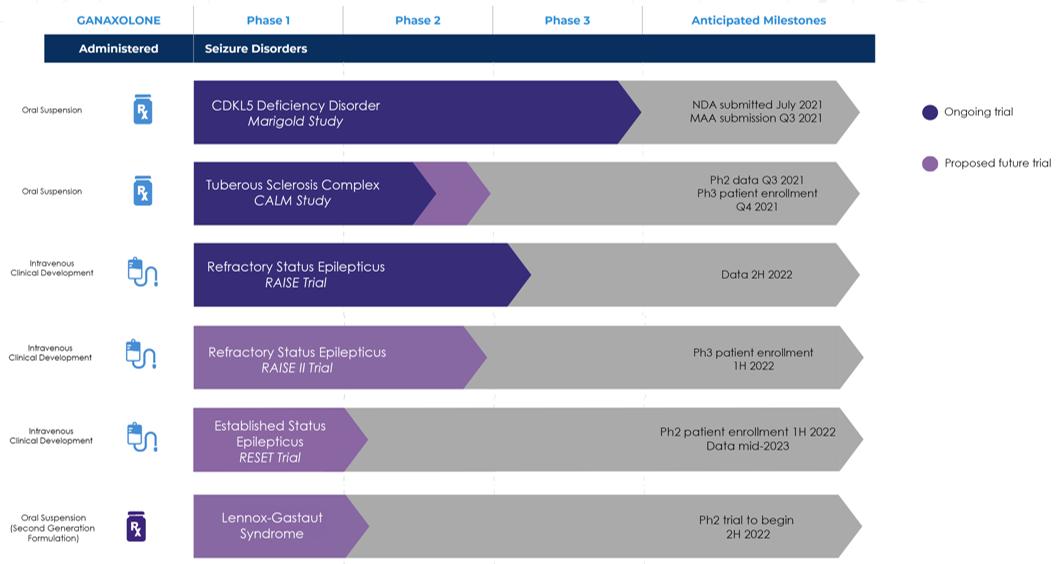on or prior to September 30, 2026 for any reason, it will not be eligible for a priority review voucher. However, it is possible the authority for the FDA to award RPD priority review vouchers will be further extended by Congress.
If a priority review voucher is granted, we may use the voucher for our own FDA approval processes or decide to sell the voucher to other biotech or pharmaceutical companies. The market for priority review vouchers has a limited history and disclosed sales prices may not be indicative of the current value of vouchers, which may also fluctuate significantly. The Consolidated Appropriations Act, 2021, which was enacted on December 27, 2020, extended the priority review voucher program such that drugs designated for an RPD by September 30, 2024 can receive a voucher if the drug is submitted and approved by September 30, 2026. Further, the potential award of a voucher would trigger an obligation to market the relevant RPD product within one year from FDA approval or the FDA may revoke the voucher. Finally, a voucher award subjects us to additional post-marketing reporting obligations to the FDA.
Failure to obtain regulatory approval in international jurisdictions would prevent ganaxolone from being marketed in these jurisdictions.
In order to market and sell our products in the EU and many other jurisdictions, we must obtain separate marketing approvals and comply with numerous and varying regulatory requirements. The approval procedure varies among countries and can involve additional testing. The time required to obtain approval may differ substantially from that required to obtain FDA approval. The regulatory approval process outside the United States generally includes all of the risks associated with obtaining FDA approval. In addition, many countries outside the United States require that a product be approved for reimbursement before the product can be approved for sale in that country. We may not obtain approvals from regulatory authorities outside the United States on a timely basis, if at all. Approval by the FDA does not ensure approval by regulatory authorities in other countries or jurisdictions, and approval by one regulatory authority outside the United States does not ensure approval by regulatory authorities in other countries or jurisdictions or by the FDA. We may not be able to file for marketing approvals and may not receive necessary approvals to commercialize our products in any market. If we are unable to obtain approval of ganaxolone by regulatory authorities in the EU or another country or jurisdiction, the commercial prospects of ganaxolone may be significantly diminished and our business prospects could decline.
Ganaxolone may be regulated as a controlled substance, the making, use, sale, importation, exportation, and distribution of which is subject to significant regulation by the DEA and other regulatory agencies.
The FDA may recommend controlled substance scheduling for ganaxolone. In such event, the DEA will need to determine the controlled substance schedule taking into account the recommendation of the FDA. The DEA regulates controlled substances as Schedule I, II, III, IV or V substances. Schedule I substances by definition have no established medicinal use, and may not be marketed or sold in the U.S. A pharmaceutical product may be listed as Schedule II, III, IV or V, with Schedule II substances considered to present the highest risk of abuse and Schedule V substances the lowest relative risk of abuse among such substances. If ganaxolone is determined to be a controlled substance, the manufacturing, shipping, distribution, import, export, packaging, storing, prescribing, dispensing, selling and use of ganaxolone will be subject to an additional regulation, including under the CSA and DEA regulations. Regulations associated with controlled substances also govern production and procurement quotas, recordkeeping, reporting, handling, and disposal Additionally, if ganaxolone is determined to be a controlled substance, facilities conducting research, manufacturing, distributing, importing or exporting, or dispending ganaxolone must be registered (licensed) to perform these activities and have the security, control, recordkeeping, reporting and inventory mechanisms required by the DEA to prevent drug loss and intervention. All these facilities must renew their registrations annually, except dispensing facilities, which must renew every three years. The DEA, and some states, also conduct periodic inspections of registered establishments that handle controlled substances. These regulations increase the personnel needs and the expense associated with development commercialization of products. Because of their restrictive nature, these laws and regulations could also limit commercialization of ganaxolone, if approved. Failure to comply with these laws and regulations could also result in withdrawal of our DEA registrations, disruption in manufacturing and distribution activities, consent decrees, criminal and civil penalties and state actions, among other consequences.
Various states also independently regulate controlled substances. Though state controlled substances laws often mirror federal law, because states are separate jurisdictions, they may separately schedule drugs as well. While some

